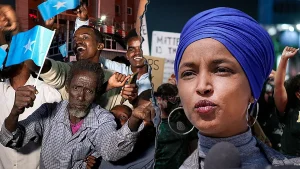Global Economic Tensions Rise as US-China Trade Decisions Loom
High-Stakes Diplomacy Unfolds at Madrid Economic Summit as Critical Deadlines Approach
The elegant conference halls of Madrid’s Palacio de Cibeles buzzed with diplomatic activity for a second consecutive day as top economic officials from around the world gathered to address mounting global trade tensions. The summit comes at a particularly critical juncture, with the United States facing imminent decision points on two fronts that could significantly impact its economic relationship with China: potential new tariff implementations and the approaching deadline for Chinese company ByteDance to divest its ownership of TikTok or face a nationwide ban. These looming deadlines have cast a shadow over the proceedings, transforming what might have been routine economic discussions into high-stakes negotiations with far-reaching implications for international commerce, digital sovereignty, and the increasingly fragile U.S.-China relationship.
The Madrid talks, originally scheduled to focus on post-pandemic economic recovery and climate finance initiatives, have been largely overshadowed by bilateral meetings between American and Chinese representatives. U.S. Treasury Secretary Janet Yellen spent much of Tuesday in closed-door sessions with her Chinese counterpart, Vice Premier He Lifeng, attempting to navigate what one senior administration official described as “the most consequential economic relationship in the world.” Sources close to the discussions revealed that the American delegation has emphasized its concerns about China’s industrial overcapacity in key sectors including electric vehicles, solar panels, and semiconductor manufacturing—industries where Chinese government subsidies have enabled production at scales that Western officials argue distort global markets. “What we’re seeing is not free market competition, but the consequences of centrally planned industrial policy that creates unsustainable global imbalances,” explained Dr. Eleanor Westbrook, senior fellow at the Peterson Institute for International Economics, who is observing the summit. “The question now is whether diplomatic channels can yield adjustments before more punitive measures become the default response.”
TikTok Divestiture Deadline Approaches Amid National Security Concerns
The most publicly visible deadline influencing the Madrid negotiations concerns the popular video-sharing platform TikTok, which faces a complete ban in the United States if its parent company ByteDance fails to sell the application to non-Chinese owners by mid-September. The legislation, signed by President Biden in April, gave ByteDance approximately six months to divest its American operations on national security grounds. With roughly half that time now elapsed and no clear divestiture plan announced, anxiety is mounting among the platform’s 170 million American users and content creators, many of whom have built businesses dependent on TikTok’s reach. ByteDance has consistently denied allegations that the Chinese government can access user data or influence content recommendations, and has challenged the constitutionality of the law in federal court. “This represents an unprecedented intervention in the digital marketplace,” noted Manuel Rodriguez, director of the Digital Rights Foundation, who is attending the Madrid summit as an observer. “The decision will establish precedent for how democracies balance national security concerns with free expression and market access in the digital domain.”
The complexities surrounding TikTok’s potential sale cannot be overstated. Industry analysts estimate the platform’s U.S. operations alone could be worth between $40-50 billion, limiting the pool of potential buyers with sufficient resources to complete such an acquisition. Moreover, the technical architecture of the platform—particularly its recommendation algorithm, widely considered ByteDance’s most valuable intellectual property—presents significant challenges for any divestiture that seeks to completely sever ties with the Chinese parent company. “The algorithm is the product,” explained Dr. Victoria Chang, professor of computer science at Stanford University. “Unlike selling a factory or retail chain, separating TikTok’s technology from ByteDance involves untangling deeply integrated systems and code bases developed over many years. This isn’t just a financial transaction—it’s a complex technological unbundling with no clear roadmap.” Chinese officials at the Madrid summit have reportedly characterized the forced divestiture as “technological protectionism disguised as security policy,” highlighting how digital platforms have become central to broader economic and geopolitical competitions.
Tariff Decisions Loom as Trade Imbalances Persist
Running parallel to the TikTok deadline is the Biden administration’s pending decision on whether to implement or modify a substantial package of new tariffs targeting Chinese imports. The Office of the U.S. Trade Representative completed its four-year review of Trump-era Section 301 tariffs earlier this spring, and the Commerce Department has been evaluating potential expansions focused specifically on electric vehicles, advanced batteries, solar panels, and medical supplies. According to sources familiar with the Madrid discussions, American officials have signaled that decisions on these tariffs could come within weeks, potentially affecting goods worth tens of billions of dollars in annual trade. The timing of these tariff announcements—coming during an election year when economic policy toward China has become a rare area of bipartisan consensus—has raised questions about whether genuine economic concerns or domestic political calculations are driving the policy timeline.
The potential economic impacts of expanded tariffs would extend far beyond direct U.S.-China trade. Global supply chains have become increasingly integrated over decades, meaning disruptions between the world’s two largest economies inevitably cascade through international markets. “We’re particularly concerned about the secondary effects,” said Martina Delgado, Spain’s Minister of Economic Affairs, who is hosting the Madrid summit. “When giants like the U.S. and China adjust their trading relationship, smaller economies often bear disproportionate adjustment costs without having any voice in the decisions.” This sentiment was echoed by representatives from Southeast Asian nations, whose economies have become deeply integrated into supply chains serving both American and Chinese markets. The summit has dedicated working groups examining how tariff escalations might affect critical mineral supplies, semiconductor manufacturing, and agricultural trade—three areas where global interdependence is particularly pronounced. Economic modeling presented at the conference suggests that new tariffs could add between 0.3 and 0.7 percentage points to U.S. inflation at a time when central banks are still working to stabilize prices after post-pandemic surges.
Diplomatic Balancing Act: Seeking Compromise Amid Structural Tensions
Behind the specific deadlines on TikTok and tariffs lies a more fundamental challenge that has dominated the Madrid discussions: finding sustainable mechanisms for economic cooperation between systems with profoundly different models of state-market relations. Western officials continue to press China on industrial subsidies, market access restrictions, and intellectual property protections, while Chinese representatives point to what they characterize as America’s selective embrace of free-market principles and the weaponization of economic policy for geopolitical aims. “What we’re witnessing isn’t simply a trade dispute but a structural adjustment in how two different economic systems coexist,” observed Dr. Hiroshi Tanaka, professor of international political economy at Tokyo University, who delivered a keynote address at the summit. “The post-Cold War assumption that economic integration would naturally lead to convergence in economic governance has proven incorrect. The challenge now is managing interdependence between persistently different systems.”
The Madrid summit represents perhaps the final major opportunity for direct engagement before the TikTok deadline and tariff decisions force concrete actions that could further strain relations. European officials have positioned themselves as potential mediators, offering frameworks for digital governance and industrial policy that might bridge U.S. and Chinese approaches. “Europe has experience developing regulatory approaches that respect different national priorities while enabling cross-border commerce,” explained Commissioner Margarethe Vestager, who leads the European Union’s digital policy portfolio. “We believe there are pathways forward that address legitimate security concerns without unnecessarily fragmenting the global digital economy.” As the summit concludes, participants acknowledge that the economic relationship between the United States and China stands at an inflection point. The decisions made in the coming weeks regarding TikTok’s ownership and tariff implementations will reveal whether the extensive diplomatic engagement in Madrid has produced pathways toward accommodation or merely delayed an acceleration of economic decoupling. For businesses, consumers, and digital users worldwide, the stakes could hardly be higher as the countdown to these critical deadlines continues.









